The Best 10 Alternatives to AWS VPN (+ Pricing & Reviews)
Twingate Team
•
Jul 10, 2024

AWS VPN allows you to securely connect your on-premises networks and remote workers to the AWS cloud. It includes AWS Client VPN and AWS Site-to-Site VPN services. However, AWS VPN might not be the choice for everyone. This article explores secure access solutions for distributed workforces.
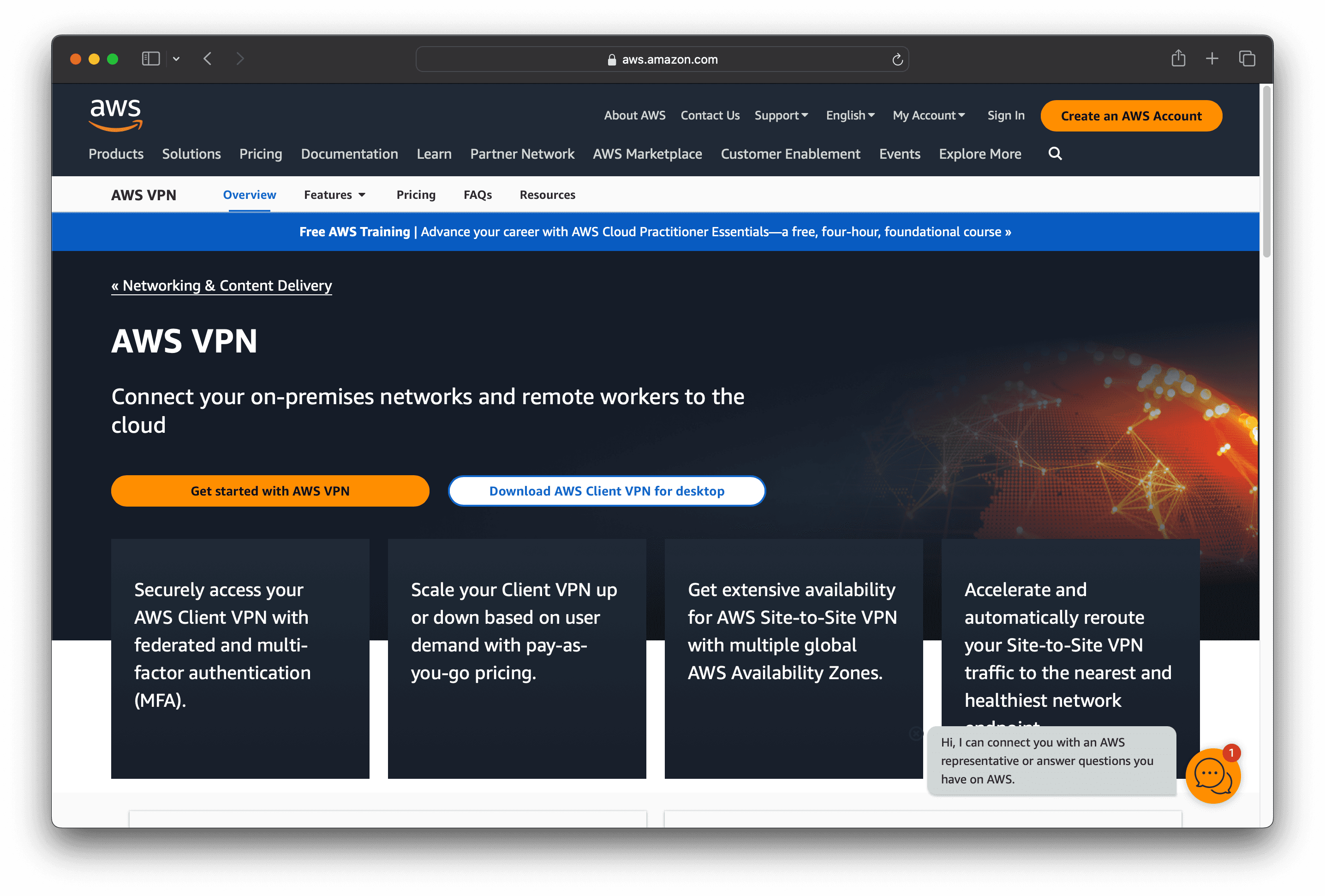
10 Alternatives to AWS VPN
1. Twingate
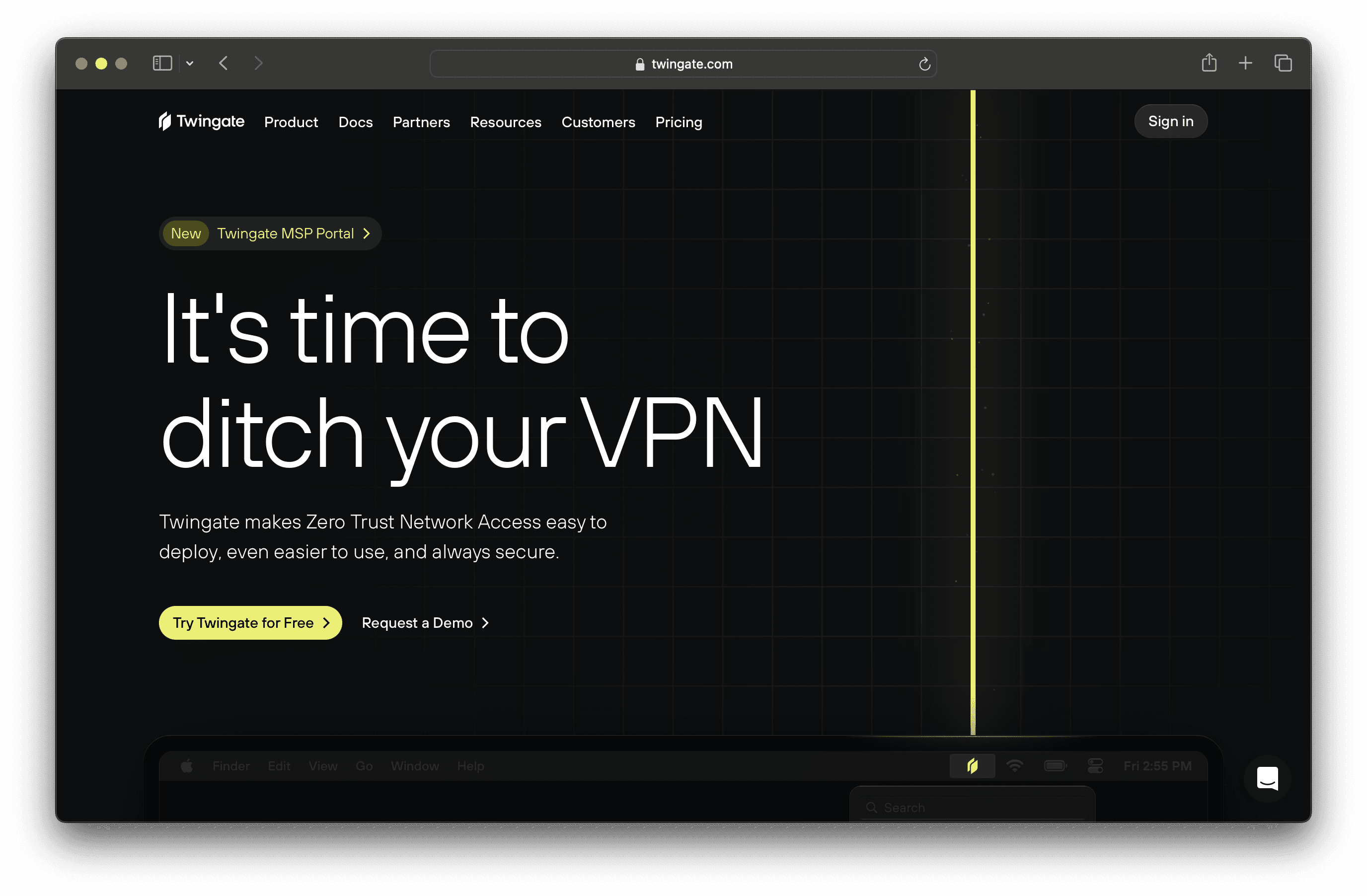
Twingate is a network security solution designed to replace traditional VPNs for remote access, offering a zero-trust security model and seamless deployment alongside existing infrastructure. With a focus on ease of use and scalability, Twingate aims to provide a secure and maintainable solution for businesses of all sizes.
Twingate Pricing
Starter: Free, up to 5 users.
Teams: $6 per user/month (monthly) or $5 per user/month (yearly).
Business: $12 per user/month (monthly) or $10 per user/month (yearly).
Enterprise: Custom pricing.
Twingate Reviews
Twingate has an overall rating of 4.7 out of 5 stars based on 63 reviews. Users praise its ease of setup, high security, and excellent performance. Check out more of our reviews here!
Pros and Cons of Twingate
Pros:
Hardware-Free: Twingate's software-based ZTNA eliminates the need for complex hardware deployments and resource-intensive maintenance.
Zero Trust Security: Implements the principle of least privilege, preventing lateral network traffic and eliminating open inbound ports.
High Performance: Reduces IT support tickets and enhances productivity with best-in-class speed, reliability, and user experience.
Cons:
Marketing Needs Improvement: Some users feel that Twingate's marketing efforts could be more effective in reaching potential customers.
Initial Setup Complexity: While generally easy to deploy, the initial configuration may require some technical knowledge, especially for integrations.
Potential Overkill: The detailed control and flexibility in routing might be excessive for users with simpler needs.
2. Watchguard
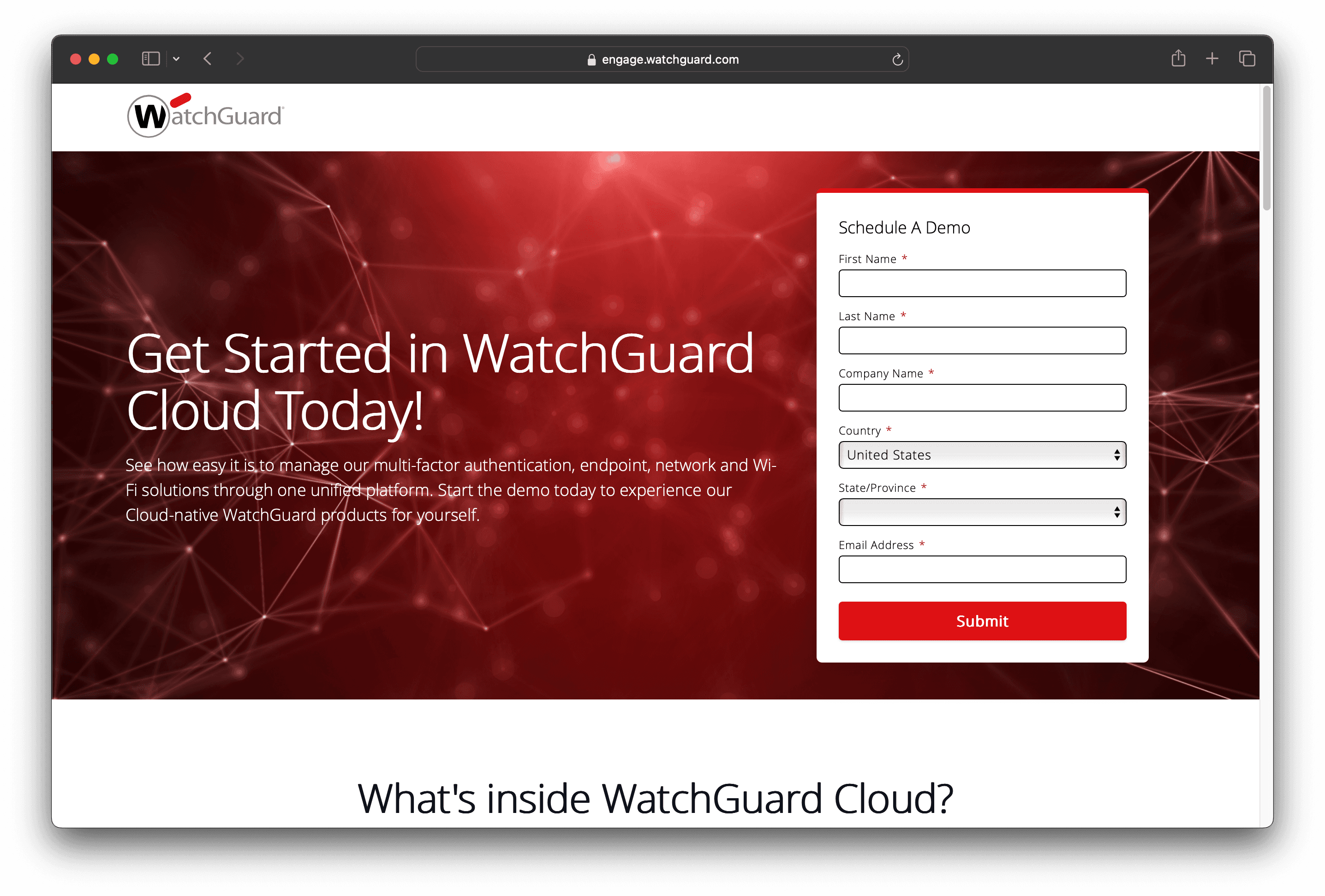
WatchGuard provides comprehensive cybersecurity solutions designed to protect businesses from a wide range of threats. With features like AI-driven network detection and response, a unified security platform, and managed detection and response services, WatchGuard aims to deliver robust, scalable, and easy-to-manage security for organizations of all sizes.
Watchguard Pricing
Watchguard's pricing is not public. Contact their support for more info.
Watchguard Reviews
WatchGuard has an overall rating of 4.7 out of 5 stars based on 258 reviews. Users praise its ease of use and comprehensive security features. Check out more of our reviews here!
Pros and Cons ofWatchguard
Pros:
Comprehensive Security: WatchGuard's unified platform simplifies deployment and management, modernizing and scaling security effortlessly.
Clarity & Control: Centralized administration through WatchGuard Cloud enhances visibility and provides advanced reporting capabilities.
Shared Knowledge: Integrated knowledge-sharing supports a zero trust, identity-based security posture and a true XDR-based strategy.
Cons:
Complexity for Small Businesses: Advanced features may overwhelm small businesses lacking dedicated IT staff.
Cost: AI-enabled solutions and 24/7 managed services can be expensive for smaller organizations.
Learning Curve: Extensive product range requires significant time and training to fully understand and utilize.
3. Zscaler
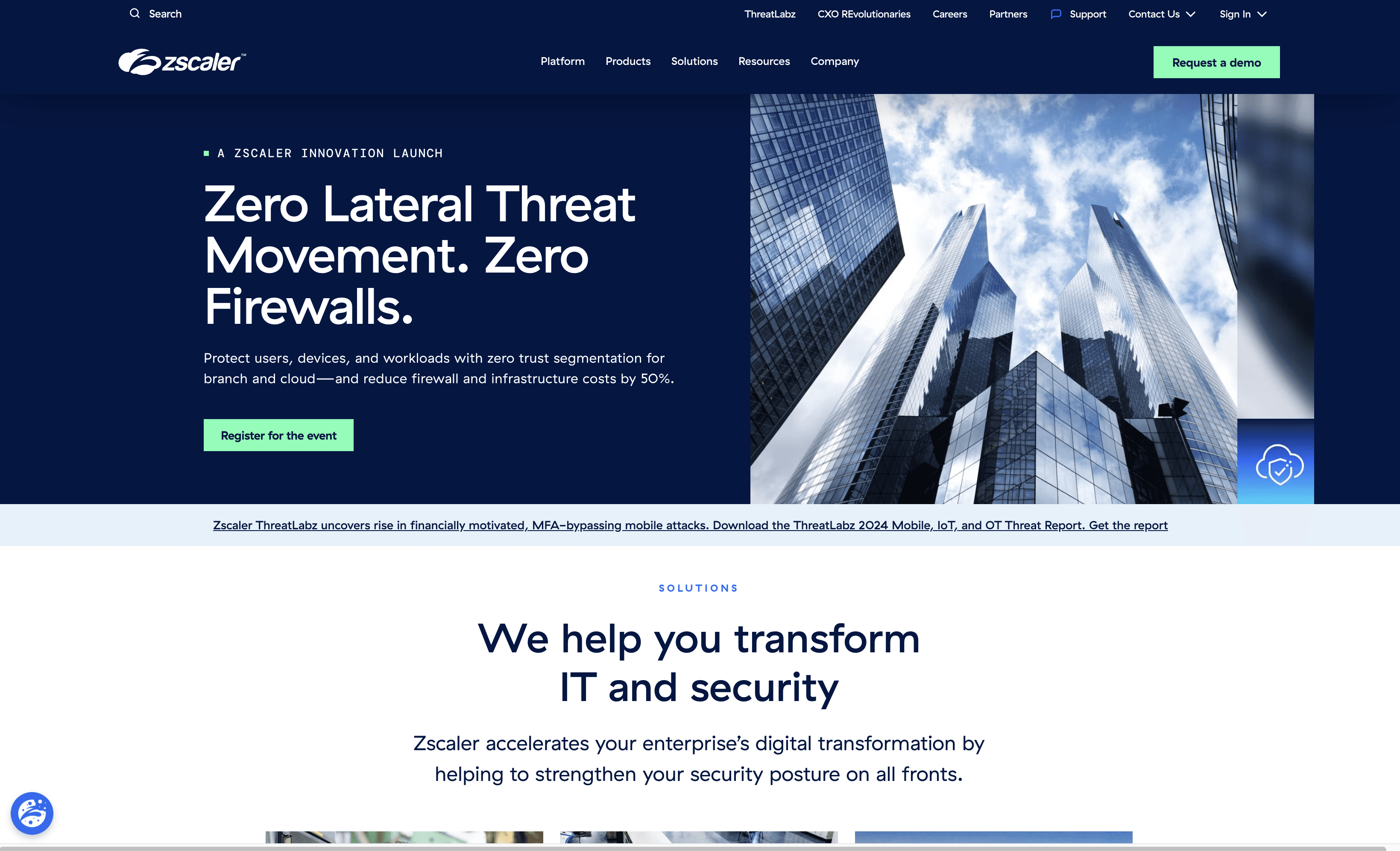
Zscaler is a cybersecurity solution that provides secure access to applications and data through a zero trust model. It aims to protect users, workloads, and devices by connecting to apps, not networks, ensuring seamless and secure connectivity for businesses of all sizes.
Zscaler Pricing
Zscaler for Users Editions: Business, Transformation
Zscaler Internet Access (ZIA) Editions: Essentials, Business, Transformation
Zscaler Private Access (ZPA) Editions: Essentials, Business, Transformation
Zscaler Digital Experience (ZDX) Plans: Standard, M365, Advanced, Advanced Plus
Zscaler's pricing is not public. Contact their support for more info.
Zscaler Reviews
Zscaler has an overall rating of 4.5 out of 5 stars based on 43 reviews. Users appreciate its robust security and ease of use. Check out more of our reviews here!
Pros and Cons of Zscaler
Pros:
Comprehensive Security: Zscaler offers a robust suite of cybersecurity solutions, ensuring protection across various threat vectors.
Zero Trust Architecture: Implements zero trust principles, securing users, workloads, and IoT/OT devices effectively.
Cloud-Native Platform: Provides seamless, cloud-native application protection and zero trust connectivity for modern enterprises.
Cons:
Complexity for New Users: The extensive range of products can be overwhelming for newcomers or smaller organizations.
Cloud Dependency: Organizations reliant on on-premises solutions may face challenges transitioning to Zscaler's cloud-native platform.
Cost Considerations: Advanced security features and comprehensive solutions may be costly for budget-conscious organizations.
4. ClearVPN
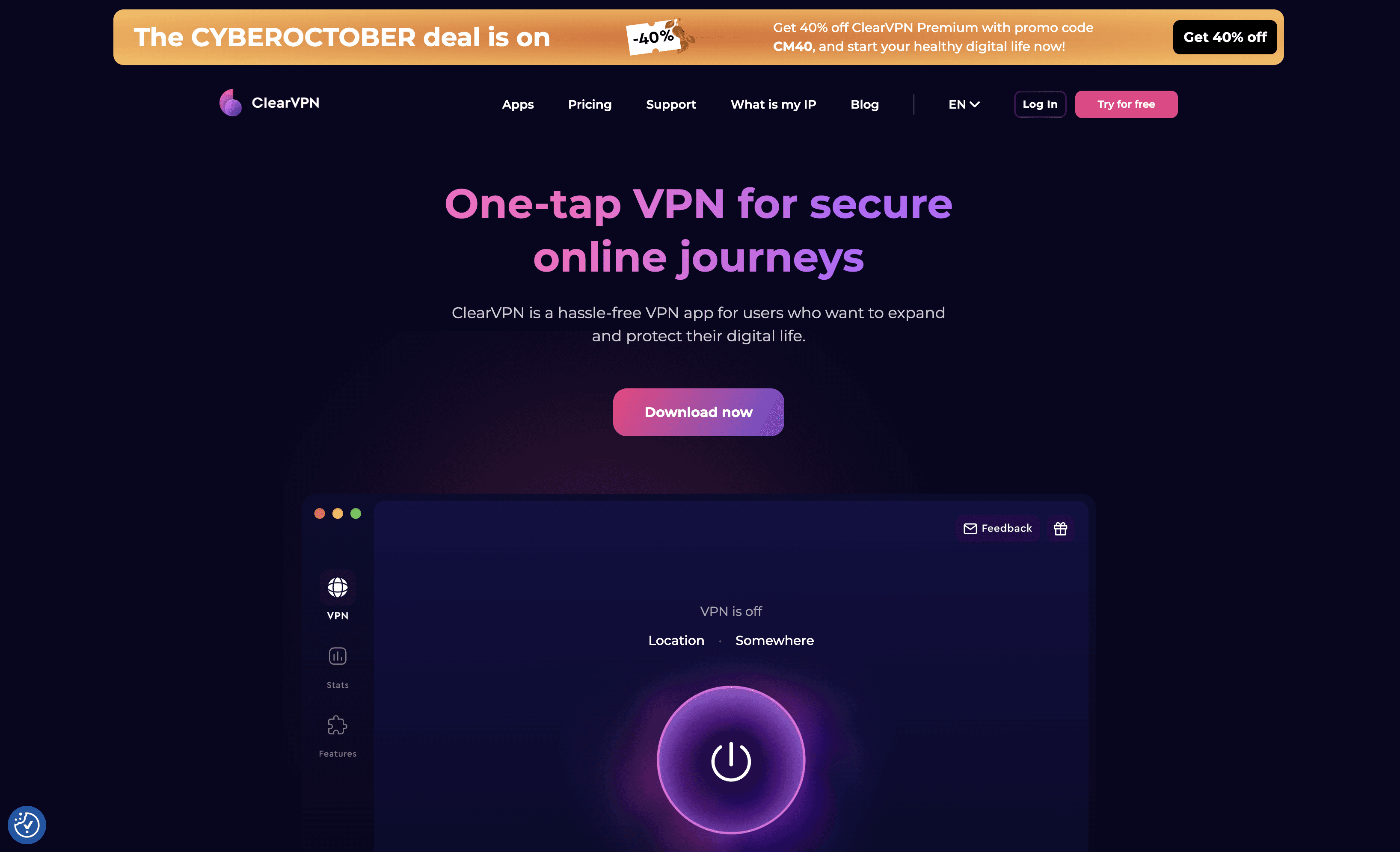
ClearVPN is a user-friendly VPN service designed to enhance online privacy and security. With a single-button interface and multiple VPN protocols, it ensures a seamless and secure browsing experience. ClearVPN is compatible with various devices, making it accessible for users of all technical levels.
ClearVPN Pricing
1 Month Plan: $9.99 per month
1 Year Plan: $3.75 per month, billed as $44.99 every year after the trial
ClearVPN Reviews
ClearVPN has an overall rating of 4.3 out of 5 stars based on 10 reviews. Users appreciate its ease of use and fast speed. Check out more of our reviews here!
Pros and Cons of ClearVPN
Pros:
Ease of Use: ClearVPN's one-tap interface makes it incredibly simple for users to secure their online activities.
Enhanced Security: High-level encryption and advanced VPN protocols ensure robust user privacy and security.
Fast Servers: Optimized servers in over 45 countries provide excellent speed and performance for various online activities.
Cons:
Limited MacOS Compatibility: The Mac version does not support older OS versions, limiting its usability for some users.
Interface Inconsistencies: Different interfaces across Mac, iOS, and Windows can confuse users switching between devices.
Subscription Requirement: Access to additional features and full benefits requires a premium subscription.
5. UTunnel VPN
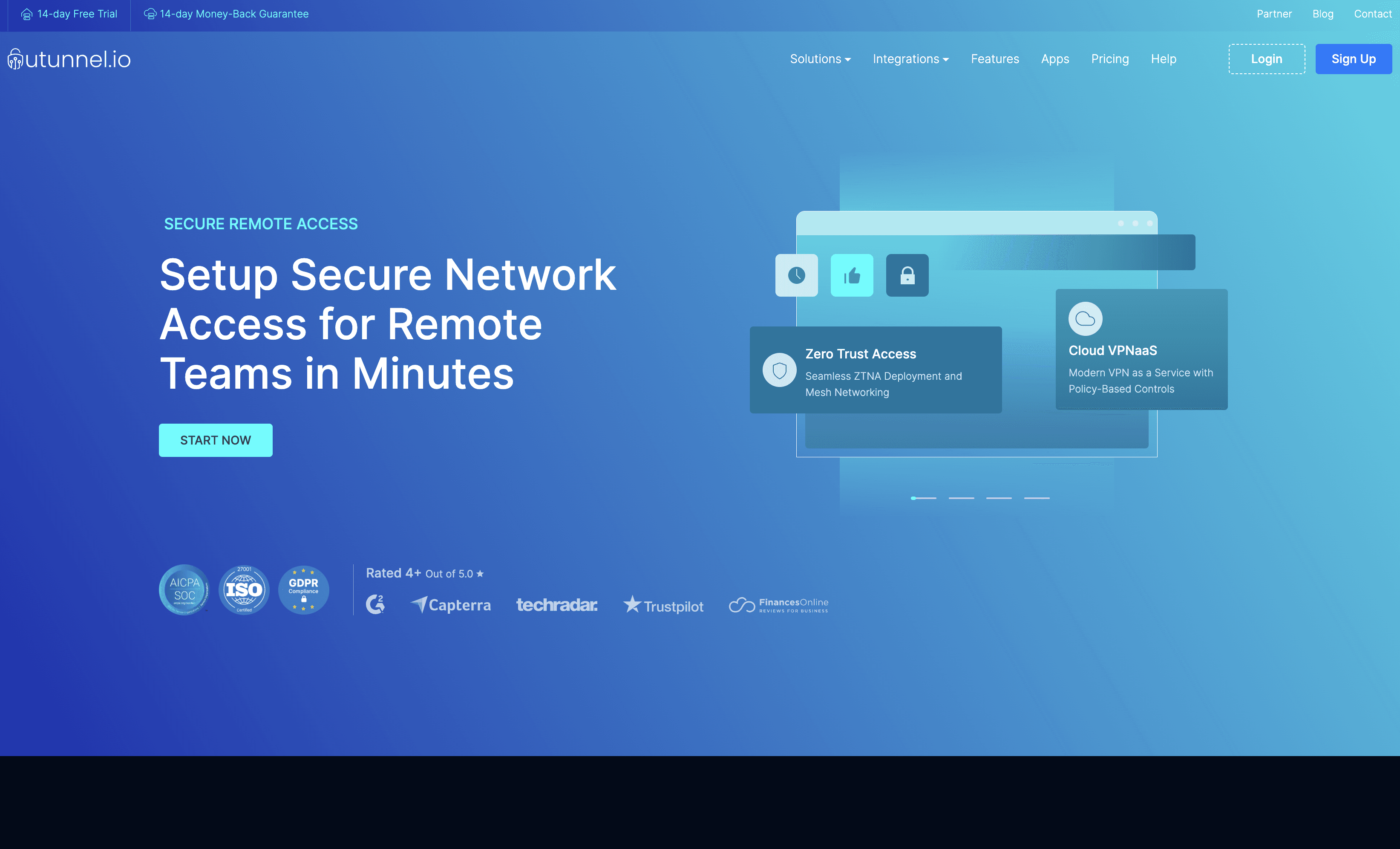
UTunnel VPN offers secure remote access and zero trust network access (ZTNA) solutions for businesses. It focuses on providing cloud VPN, mesh networking, and seamless integration with existing infrastructure. UTunnel aims to deliver robust security and easy deployment, making it suitable for organizations of all sizes.
UTunnel VPN Pricing
Basic Plan: $6.00 per month
Standard Plan: $8.00 per month
Bespoke plans are available based on volume.
UTunnel VPN Reviews
UTunnel VPN has an overall rating of 4.8 out of 5 stars based on 23 reviews. Users appreciate its ease of setup and reliable security. Check out more of our reviews here!
Pros and Cons of UTunnel VPN
Pros:
Ease of Setup: UTunnel VPN offers a straightforward setup process, making it accessible even for users with minimal technical expertise.
Zero Trust Access: Provides secure, policy-based access to business applications, ensuring robust protection for sensitive data.
Comprehensive Features: Includes centralized management, device-level control, and custom web filters, enhancing overall network security.
Cons:
Potential Complexity: Advanced features may require a certain level of technical understanding, posing challenges for non-technical users.
Cost: Pricing might be considered high for very small businesses or individual users, despite transparent plans.
Internet Dependency: Reliable internet connectivity is crucial for optimal performance, which can be a limitation in some scenarios.
6. Namecheap VPN Service
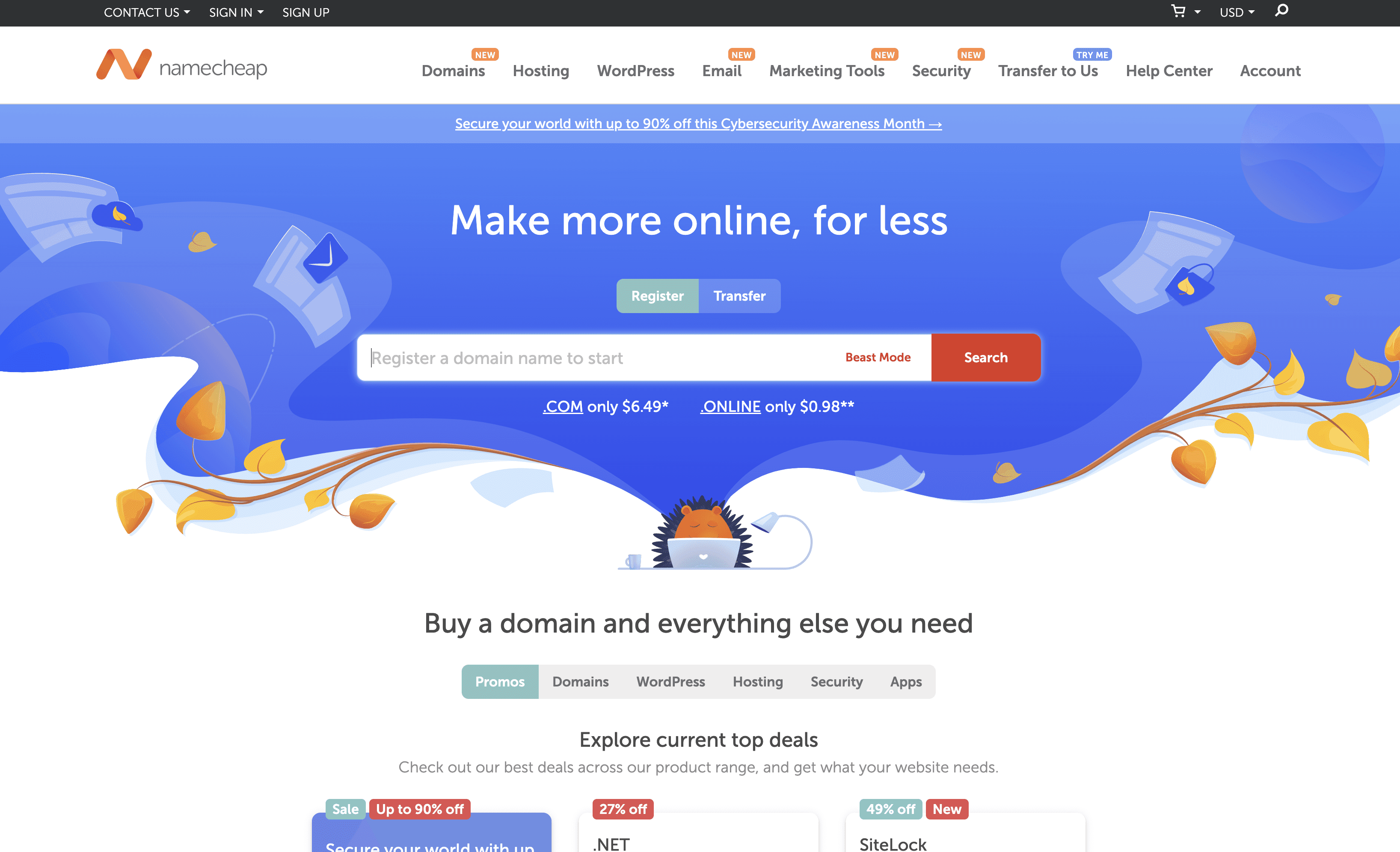
Namecheap VPN is a service designed to enhance online privacy and security. It offers a user-friendly interface and multiple VPN protocols, ensuring a seamless and secure browsing experience. Compatible with various devices, Namecheap VPN aims to provide robust protection for users of all technical levels.
Namecheap VPN Service Pricing
1 Month Plan: $5.88 per month
1 Year Plan: $1.88 per month, billed as $22.56 annually
3 Year Plan: $1.00 per month, billed as $36.00 triennially
Namecheap VPN Service Reviews
Namecheap VPN Service has an overall rating of 4.4 out of 5 stars based on 11 reviews. Users appreciate its high speed and reliability. Check out more of our reviews here!
Pros and Cons of Namecheap VPN Service
Pros:
High Internet Speed: Users appreciate the high internet speed, with minimal bandwidth reduction, ensuring a smooth browsing experience.
Strong Security: The service is noted for its robust security features, including military-grade encryption, safeguarding user data.
Global Accessibility: Provides access to multiple locations and servers worldwide, enhancing user flexibility and connectivity.
Cons:
Lack of Guidance: Some users find the service lacks sufficient guidance for first-time users, making initial setup challenging.
Server Instability: Occasional server instability and connection issues have been reported, affecting reliability.
Interface Inconsistencies: Different interfaces across devices can confuse users switching between platforms, impacting user experience.
7. Ivanti
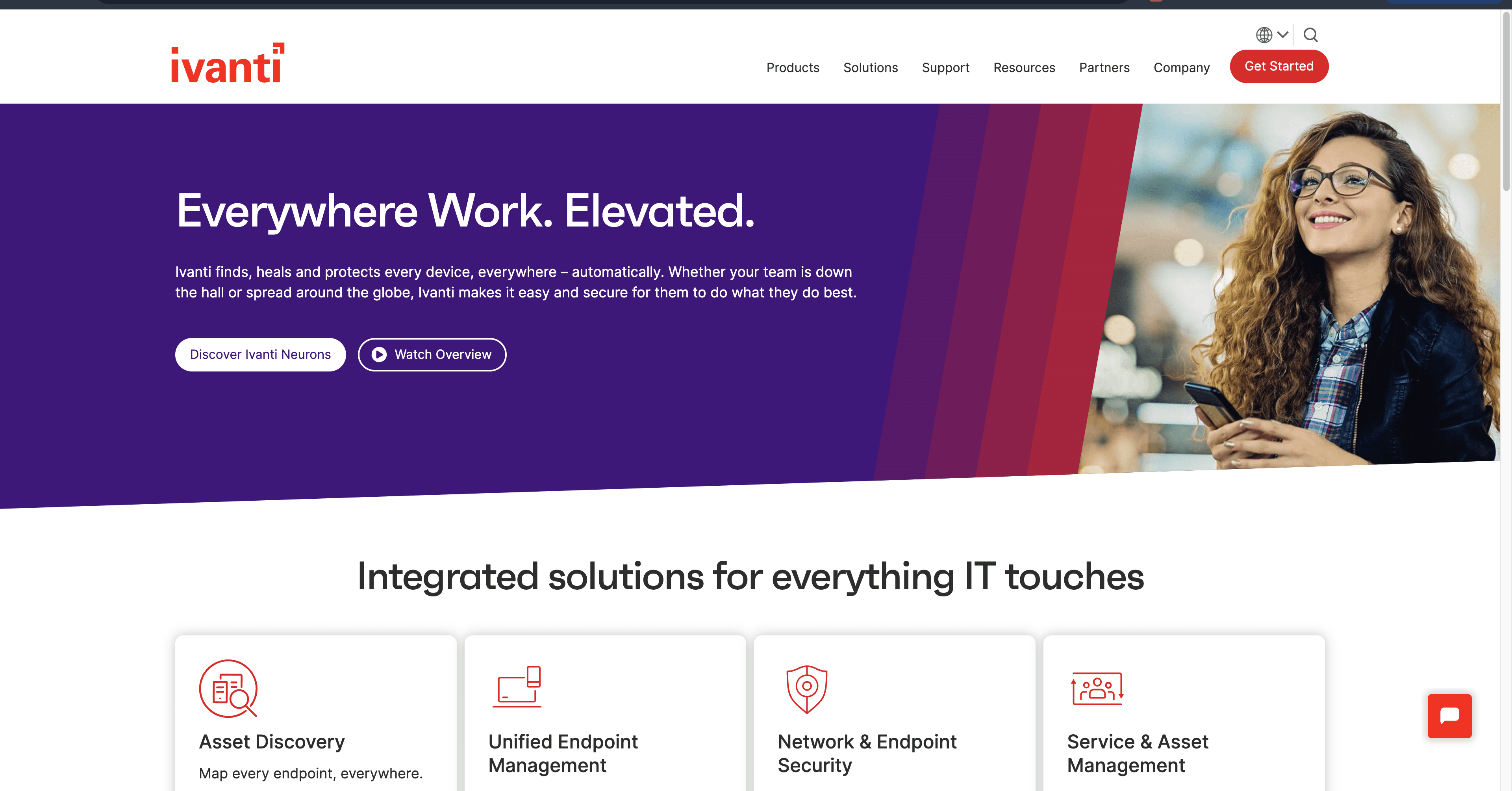
Ivanti provides IT solutions for managing and securing devices and services across various environments. With capabilities in asset discovery, endpoint management, network security, and service management, Ivanti aims to deliver robust, scalable, and easy-to-manage security for organizations of all sizes.
Ivanti Pricing
ITSM Professional
ITSM Premium
ITSM Enterprise
ITSM Enterprise Premium
Secure UEM Professional
Secure UEM Professional Plus
Secure UEM Premium
Ivanti's pricing is not public. Contact their support for more info.
Ivanti Reviews
Ivanti has an overall rating of 4.3 out of 5 stars based on 87 reviews. Users praise its stability and detailed configuration options. Check out more of our reviews here!
Pros and Cons of Ivanti
Pros:
Comprehensive IT Solutions: Ivanti offers a wide range of products covering enterprise service management, endpoint management, and network security.
Global Trust: Trusted by over 40,000 customers worldwide, indicating strong reliability and reputation.
Integrated Approach: Provides integrated solutions for asset discovery, unified endpoint management, and service management.
Cons:
Complexity: The extensive range of products can be overwhelming for new users or smaller organizations.
Transition Notice: Upcoming operational changes may cause uncertainty or require adjustments for existing customers.
Cookie Management: Detailed cookie consent options might be seen as cumbersome by some users.
8. Cato Networks
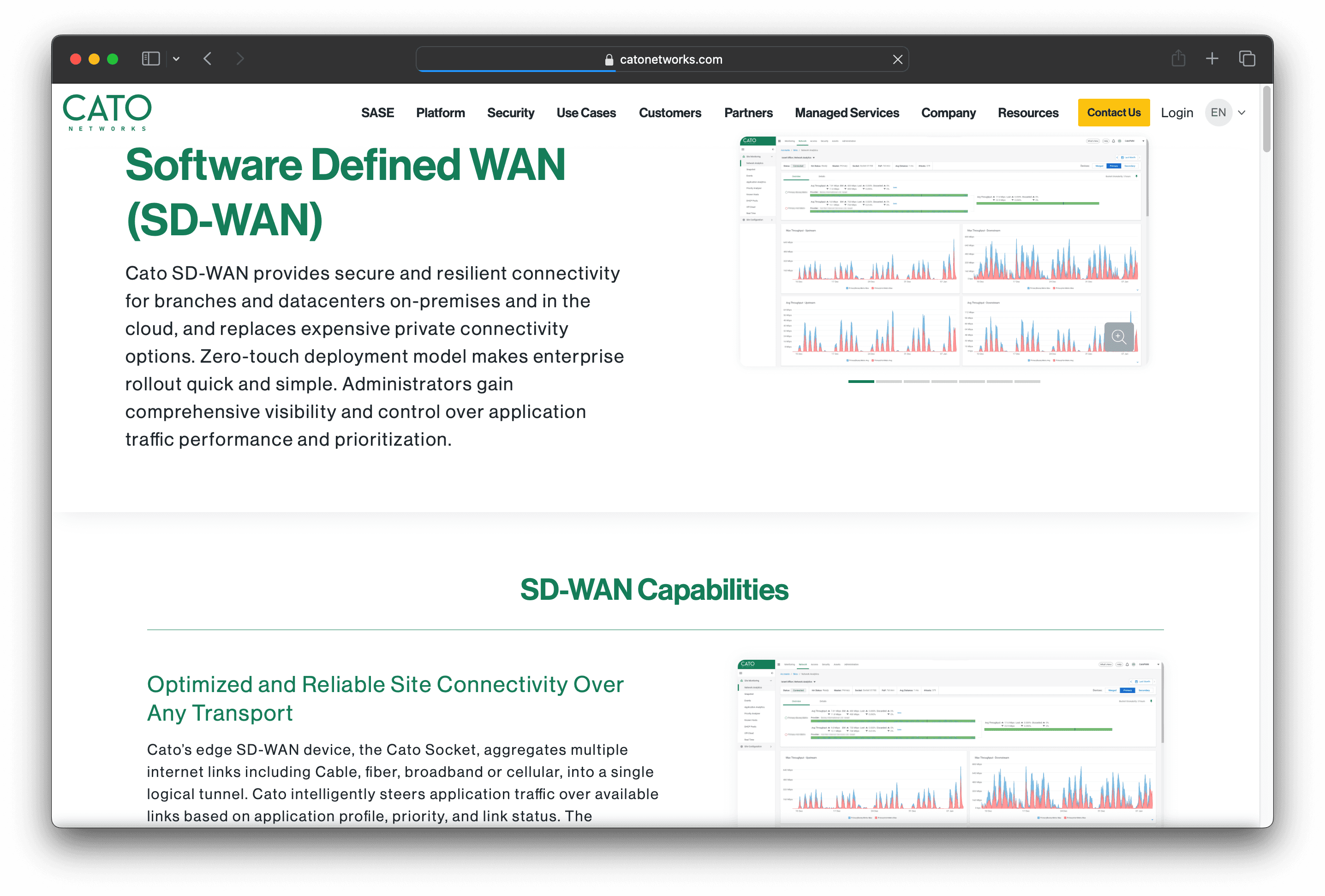
Cato Networks provides a Secure Access Service Edge (SASE) platform that integrates networking and security into a single cloud-native service. It offers global private backbone connectivity, threat prevention, data protection, and zero trust network access, ensuring seamless and secure connectivity for businesses of all sizes.
Cato Networks Pricing
Cato Networks's pricing is not public. Contact their support for more info.
Cato Networks Reviews
Cato Networks has an overall rating of 4.4 out of 5 stars based on 73 reviews. Users appreciate its centralized console and excellent product support. Check out more of our reviews here!
Pros and Cons of Cato Networks
Pros:
Comprehensive SASE Platform: Cato Networks offers a fully converged, cloud-native suite of threat prevention and data protection capabilities.
Global Private Backbone: Provides a purpose-built global, private backbone with embedded security and optimization for all traffic.
AI and Machine Learning: Utilizes AI/ML for threat intelligence, incident detection, and response, enhancing security measures.
Cons:
Complexity: The comprehensive nature of the platform might be overwhelming for smaller organizations or those without dedicated IT teams.
Cost: Advanced features and global infrastructure suggest that the service might be costly, potentially limiting accessibility for smaller enterprises.
Implementation Time: Despite claims of quick deployment, actual implementation time may vary depending on existing network complexity.
9. IVPN
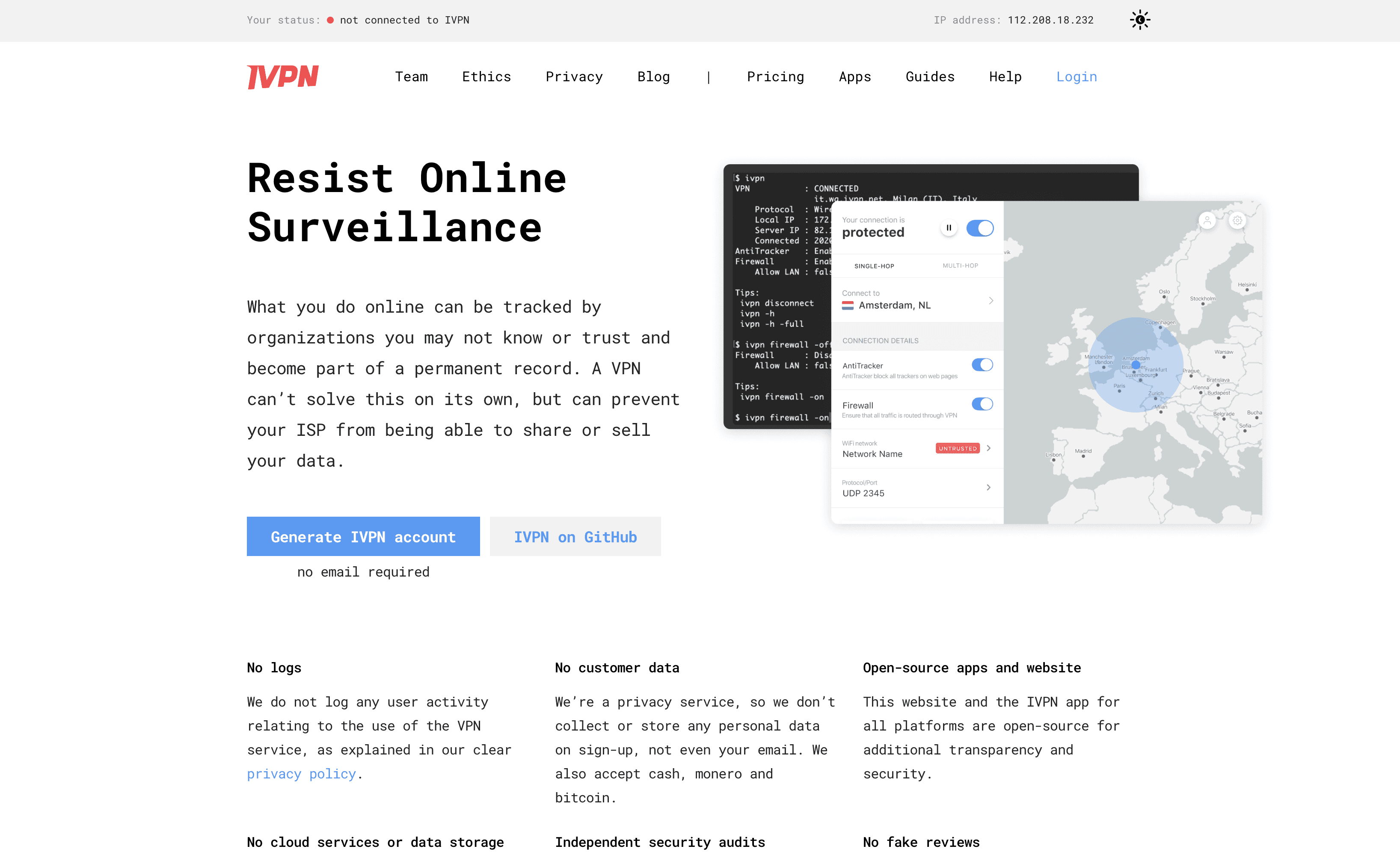
IVPN is a VPN service focused on privacy and security, offering features like multi-hop VPN routes, private DNS servers, and a no-logs policy. With user-friendly apps and no email required for sign-up, IVPN aims to provide robust protection against online surveillance for users of all technical levels.
IVPN Pricing
IVPN Standard: $2 for 1 Week, $6 for 1 Month, $60 for 1 Year, $100 for 2 Years, $140 for 3 Years.
IVPN Pro: $4 for 1 Week, $10 for 1 Month, $100 for 1 Year, $160 for 2 Years, $220 for 3 Years.
IVPN Reviews
IVPN has an overall rating of 4.2 out of 5 stars based on 12 reviews. Users appreciate its ease of use and robust security. Check out more of our reviews here!
Pros and Cons of IVPN
Pros:
Privacy and Security: IVPN does not log user activity or require personal identification, ensuring robust privacy.
Multi-Hop Connection: Supports routing through multiple servers, adding an extra layer of security for users.
User-Friendly Interface: Simple touch-and-connect feature makes it easy for users to secure their online activities.
Cons:
Expensive: IVPN is considered pricey compared to other VPN providers, which may deter budget-conscious users.
Manual Server Switching: Users must disconnect from one server before connecting to another, which can be inconvenient.
Limited Server Count: IVPN has a lower server count compared to competitors, potentially affecting connectivity options.
10. Azure VPN Gateway
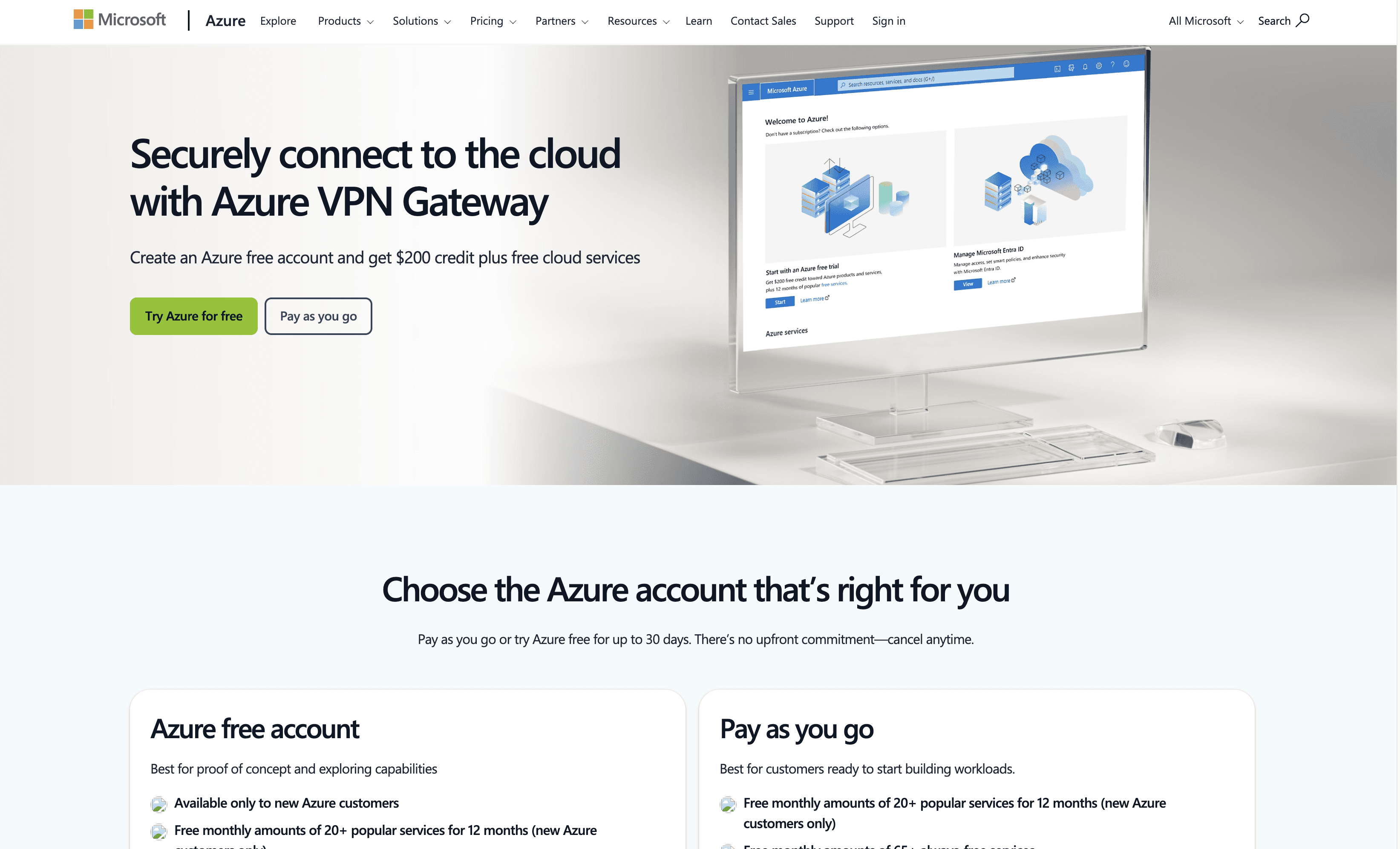
Azure VPN Gateway is a service by Microsoft Azure that enables secure connections to the cloud. It offers seamless integration with existing infrastructure and supports various VPN protocols. Designed for scalability and ease of use, Azure VPN Gateway ensures reliable and secure connectivity for businesses of all sizes.
Azure VPN Gateway Pricing
Azure Free Account: Free for new customers.
Pay as You Go: No upfront commitment.
Azure VPN Gateway Reviews
Azure VPN Gateway has an overall rating of 4.1 out of 5 stars based on 21 reviews. Users appreciate its ease of setup and robust security. Check out more of our reviews here!
Pros and Cons of Azure VPN Gateway
Pros:
Ease of Setup: Users find Azure VPN Gateway straightforward to set up and configure, minimizing initial deployment time.
Security: Provides secure connections using industry-standard protocols, ensuring robust protection for data in transit.
Reliability: Known for its reliability and minimal downtime, offering consistent performance for business operations.
Cons:
Certificate Generation: The process of generating certificates can be cumbersome, lacking direct integration within the Azure portal.
Cost: Some users find the service expensive, which may be a concern for budget-conscious organizations.
Implementation Time: Initial setup and configuration can be time-consuming, potentially delaying deployment.
Looking to secure your technical infrastructure?
Twingate offers granular access controls and deployment automations to protect your VPC environment. By leveraging Zero Trust security tools, Twingate ensures that private resources and internet traffic remain secure in the modern world of work. Try Twingate for Free today!
Rapidly implement a modern Zero Trust network that is more secure and maintainable than VPNs.
The Best 10 Alternatives to AWS VPN (+ Pricing & Reviews)
Twingate Team
•
Jul 10, 2024

AWS VPN allows you to securely connect your on-premises networks and remote workers to the AWS cloud. It includes AWS Client VPN and AWS Site-to-Site VPN services. However, AWS VPN might not be the choice for everyone. This article explores secure access solutions for distributed workforces.

10 Alternatives to AWS VPN
1. Twingate

Twingate is a network security solution designed to replace traditional VPNs for remote access, offering a zero-trust security model and seamless deployment alongside existing infrastructure. With a focus on ease of use and scalability, Twingate aims to provide a secure and maintainable solution for businesses of all sizes.
Twingate Pricing
Starter: Free, up to 5 users.
Teams: $6 per user/month (monthly) or $5 per user/month (yearly).
Business: $12 per user/month (monthly) or $10 per user/month (yearly).
Enterprise: Custom pricing.
Twingate Reviews
Twingate has an overall rating of 4.7 out of 5 stars based on 63 reviews. Users praise its ease of setup, high security, and excellent performance. Check out more of our reviews here!
Pros and Cons of Twingate
Pros:
Hardware-Free: Twingate's software-based ZTNA eliminates the need for complex hardware deployments and resource-intensive maintenance.
Zero Trust Security: Implements the principle of least privilege, preventing lateral network traffic and eliminating open inbound ports.
High Performance: Reduces IT support tickets and enhances productivity with best-in-class speed, reliability, and user experience.
Cons:
Marketing Needs Improvement: Some users feel that Twingate's marketing efforts could be more effective in reaching potential customers.
Initial Setup Complexity: While generally easy to deploy, the initial configuration may require some technical knowledge, especially for integrations.
Potential Overkill: The detailed control and flexibility in routing might be excessive for users with simpler needs.
2. Watchguard

WatchGuard provides comprehensive cybersecurity solutions designed to protect businesses from a wide range of threats. With features like AI-driven network detection and response, a unified security platform, and managed detection and response services, WatchGuard aims to deliver robust, scalable, and easy-to-manage security for organizations of all sizes.
Watchguard Pricing
Watchguard's pricing is not public. Contact their support for more info.
Watchguard Reviews
WatchGuard has an overall rating of 4.7 out of 5 stars based on 258 reviews. Users praise its ease of use and comprehensive security features. Check out more of our reviews here!
Pros and Cons ofWatchguard
Pros:
Comprehensive Security: WatchGuard's unified platform simplifies deployment and management, modernizing and scaling security effortlessly.
Clarity & Control: Centralized administration through WatchGuard Cloud enhances visibility and provides advanced reporting capabilities.
Shared Knowledge: Integrated knowledge-sharing supports a zero trust, identity-based security posture and a true XDR-based strategy.
Cons:
Complexity for Small Businesses: Advanced features may overwhelm small businesses lacking dedicated IT staff.
Cost: AI-enabled solutions and 24/7 managed services can be expensive for smaller organizations.
Learning Curve: Extensive product range requires significant time and training to fully understand and utilize.
3. Zscaler

Zscaler is a cybersecurity solution that provides secure access to applications and data through a zero trust model. It aims to protect users, workloads, and devices by connecting to apps, not networks, ensuring seamless and secure connectivity for businesses of all sizes.
Zscaler Pricing
Zscaler for Users Editions: Business, Transformation
Zscaler Internet Access (ZIA) Editions: Essentials, Business, Transformation
Zscaler Private Access (ZPA) Editions: Essentials, Business, Transformation
Zscaler Digital Experience (ZDX) Plans: Standard, M365, Advanced, Advanced Plus
Zscaler's pricing is not public. Contact their support for more info.
Zscaler Reviews
Zscaler has an overall rating of 4.5 out of 5 stars based on 43 reviews. Users appreciate its robust security and ease of use. Check out more of our reviews here!
Pros and Cons of Zscaler
Pros:
Comprehensive Security: Zscaler offers a robust suite of cybersecurity solutions, ensuring protection across various threat vectors.
Zero Trust Architecture: Implements zero trust principles, securing users, workloads, and IoT/OT devices effectively.
Cloud-Native Platform: Provides seamless, cloud-native application protection and zero trust connectivity for modern enterprises.
Cons:
Complexity for New Users: The extensive range of products can be overwhelming for newcomers or smaller organizations.
Cloud Dependency: Organizations reliant on on-premises solutions may face challenges transitioning to Zscaler's cloud-native platform.
Cost Considerations: Advanced security features and comprehensive solutions may be costly for budget-conscious organizations.
4. ClearVPN

ClearVPN is a user-friendly VPN service designed to enhance online privacy and security. With a single-button interface and multiple VPN protocols, it ensures a seamless and secure browsing experience. ClearVPN is compatible with various devices, making it accessible for users of all technical levels.
ClearVPN Pricing
1 Month Plan: $9.99 per month
1 Year Plan: $3.75 per month, billed as $44.99 every year after the trial
ClearVPN Reviews
ClearVPN has an overall rating of 4.3 out of 5 stars based on 10 reviews. Users appreciate its ease of use and fast speed. Check out more of our reviews here!
Pros and Cons of ClearVPN
Pros:
Ease of Use: ClearVPN's one-tap interface makes it incredibly simple for users to secure their online activities.
Enhanced Security: High-level encryption and advanced VPN protocols ensure robust user privacy and security.
Fast Servers: Optimized servers in over 45 countries provide excellent speed and performance for various online activities.
Cons:
Limited MacOS Compatibility: The Mac version does not support older OS versions, limiting its usability for some users.
Interface Inconsistencies: Different interfaces across Mac, iOS, and Windows can confuse users switching between devices.
Subscription Requirement: Access to additional features and full benefits requires a premium subscription.
5. UTunnel VPN

UTunnel VPN offers secure remote access and zero trust network access (ZTNA) solutions for businesses. It focuses on providing cloud VPN, mesh networking, and seamless integration with existing infrastructure. UTunnel aims to deliver robust security and easy deployment, making it suitable for organizations of all sizes.
UTunnel VPN Pricing
Basic Plan: $6.00 per month
Standard Plan: $8.00 per month
Bespoke plans are available based on volume.
UTunnel VPN Reviews
UTunnel VPN has an overall rating of 4.8 out of 5 stars based on 23 reviews. Users appreciate its ease of setup and reliable security. Check out more of our reviews here!
Pros and Cons of UTunnel VPN
Pros:
Ease of Setup: UTunnel VPN offers a straightforward setup process, making it accessible even for users with minimal technical expertise.
Zero Trust Access: Provides secure, policy-based access to business applications, ensuring robust protection for sensitive data.
Comprehensive Features: Includes centralized management, device-level control, and custom web filters, enhancing overall network security.
Cons:
Potential Complexity: Advanced features may require a certain level of technical understanding, posing challenges for non-technical users.
Cost: Pricing might be considered high for very small businesses or individual users, despite transparent plans.
Internet Dependency: Reliable internet connectivity is crucial for optimal performance, which can be a limitation in some scenarios.
6. Namecheap VPN Service

Namecheap VPN is a service designed to enhance online privacy and security. It offers a user-friendly interface and multiple VPN protocols, ensuring a seamless and secure browsing experience. Compatible with various devices, Namecheap VPN aims to provide robust protection for users of all technical levels.
Namecheap VPN Service Pricing
1 Month Plan: $5.88 per month
1 Year Plan: $1.88 per month, billed as $22.56 annually
3 Year Plan: $1.00 per month, billed as $36.00 triennially
Namecheap VPN Service Reviews
Namecheap VPN Service has an overall rating of 4.4 out of 5 stars based on 11 reviews. Users appreciate its high speed and reliability. Check out more of our reviews here!
Pros and Cons of Namecheap VPN Service
Pros:
High Internet Speed: Users appreciate the high internet speed, with minimal bandwidth reduction, ensuring a smooth browsing experience.
Strong Security: The service is noted for its robust security features, including military-grade encryption, safeguarding user data.
Global Accessibility: Provides access to multiple locations and servers worldwide, enhancing user flexibility and connectivity.
Cons:
Lack of Guidance: Some users find the service lacks sufficient guidance for first-time users, making initial setup challenging.
Server Instability: Occasional server instability and connection issues have been reported, affecting reliability.
Interface Inconsistencies: Different interfaces across devices can confuse users switching between platforms, impacting user experience.
7. Ivanti

Ivanti provides IT solutions for managing and securing devices and services across various environments. With capabilities in asset discovery, endpoint management, network security, and service management, Ivanti aims to deliver robust, scalable, and easy-to-manage security for organizations of all sizes.
Ivanti Pricing
ITSM Professional
ITSM Premium
ITSM Enterprise
ITSM Enterprise Premium
Secure UEM Professional
Secure UEM Professional Plus
Secure UEM Premium
Ivanti's pricing is not public. Contact their support for more info.
Ivanti Reviews
Ivanti has an overall rating of 4.3 out of 5 stars based on 87 reviews. Users praise its stability and detailed configuration options. Check out more of our reviews here!
Pros and Cons of Ivanti
Pros:
Comprehensive IT Solutions: Ivanti offers a wide range of products covering enterprise service management, endpoint management, and network security.
Global Trust: Trusted by over 40,000 customers worldwide, indicating strong reliability and reputation.
Integrated Approach: Provides integrated solutions for asset discovery, unified endpoint management, and service management.
Cons:
Complexity: The extensive range of products can be overwhelming for new users or smaller organizations.
Transition Notice: Upcoming operational changes may cause uncertainty or require adjustments for existing customers.
Cookie Management: Detailed cookie consent options might be seen as cumbersome by some users.
8. Cato Networks

Cato Networks provides a Secure Access Service Edge (SASE) platform that integrates networking and security into a single cloud-native service. It offers global private backbone connectivity, threat prevention, data protection, and zero trust network access, ensuring seamless and secure connectivity for businesses of all sizes.
Cato Networks Pricing
Cato Networks's pricing is not public. Contact their support for more info.
Cato Networks Reviews
Cato Networks has an overall rating of 4.4 out of 5 stars based on 73 reviews. Users appreciate its centralized console and excellent product support. Check out more of our reviews here!
Pros and Cons of Cato Networks
Pros:
Comprehensive SASE Platform: Cato Networks offers a fully converged, cloud-native suite of threat prevention and data protection capabilities.
Global Private Backbone: Provides a purpose-built global, private backbone with embedded security and optimization for all traffic.
AI and Machine Learning: Utilizes AI/ML for threat intelligence, incident detection, and response, enhancing security measures.
Cons:
Complexity: The comprehensive nature of the platform might be overwhelming for smaller organizations or those without dedicated IT teams.
Cost: Advanced features and global infrastructure suggest that the service might be costly, potentially limiting accessibility for smaller enterprises.
Implementation Time: Despite claims of quick deployment, actual implementation time may vary depending on existing network complexity.
9. IVPN

IVPN is a VPN service focused on privacy and security, offering features like multi-hop VPN routes, private DNS servers, and a no-logs policy. With user-friendly apps and no email required for sign-up, IVPN aims to provide robust protection against online surveillance for users of all technical levels.
IVPN Pricing
IVPN Standard: $2 for 1 Week, $6 for 1 Month, $60 for 1 Year, $100 for 2 Years, $140 for 3 Years.
IVPN Pro: $4 for 1 Week, $10 for 1 Month, $100 for 1 Year, $160 for 2 Years, $220 for 3 Years.
IVPN Reviews
IVPN has an overall rating of 4.2 out of 5 stars based on 12 reviews. Users appreciate its ease of use and robust security. Check out more of our reviews here!
Pros and Cons of IVPN
Pros:
Privacy and Security: IVPN does not log user activity or require personal identification, ensuring robust privacy.
Multi-Hop Connection: Supports routing through multiple servers, adding an extra layer of security for users.
User-Friendly Interface: Simple touch-and-connect feature makes it easy for users to secure their online activities.
Cons:
Expensive: IVPN is considered pricey compared to other VPN providers, which may deter budget-conscious users.
Manual Server Switching: Users must disconnect from one server before connecting to another, which can be inconvenient.
Limited Server Count: IVPN has a lower server count compared to competitors, potentially affecting connectivity options.
10. Azure VPN Gateway

Azure VPN Gateway is a service by Microsoft Azure that enables secure connections to the cloud. It offers seamless integration with existing infrastructure and supports various VPN protocols. Designed for scalability and ease of use, Azure VPN Gateway ensures reliable and secure connectivity for businesses of all sizes.
Azure VPN Gateway Pricing
Azure Free Account: Free for new customers.
Pay as You Go: No upfront commitment.
Azure VPN Gateway Reviews
Azure VPN Gateway has an overall rating of 4.1 out of 5 stars based on 21 reviews. Users appreciate its ease of setup and robust security. Check out more of our reviews here!
Pros and Cons of Azure VPN Gateway
Pros:
Ease of Setup: Users find Azure VPN Gateway straightforward to set up and configure, minimizing initial deployment time.
Security: Provides secure connections using industry-standard protocols, ensuring robust protection for data in transit.
Reliability: Known for its reliability and minimal downtime, offering consistent performance for business operations.
Cons:
Certificate Generation: The process of generating certificates can be cumbersome, lacking direct integration within the Azure portal.
Cost: Some users find the service expensive, which may be a concern for budget-conscious organizations.
Implementation Time: Initial setup and configuration can be time-consuming, potentially delaying deployment.
Looking to secure your technical infrastructure?
Twingate offers granular access controls and deployment automations to protect your VPC environment. By leveraging Zero Trust security tools, Twingate ensures that private resources and internet traffic remain secure in the modern world of work. Try Twingate for Free today!
Rapidly implement a modern Zero Trust network that is more secure and maintainable than VPNs.
The Best 10 Alternatives to AWS VPN (+ Pricing & Reviews)
Twingate Team
•
Jul 10, 2024

AWS VPN allows you to securely connect your on-premises networks and remote workers to the AWS cloud. It includes AWS Client VPN and AWS Site-to-Site VPN services. However, AWS VPN might not be the choice for everyone. This article explores secure access solutions for distributed workforces.

10 Alternatives to AWS VPN
1. Twingate

Twingate is a network security solution designed to replace traditional VPNs for remote access, offering a zero-trust security model and seamless deployment alongside existing infrastructure. With a focus on ease of use and scalability, Twingate aims to provide a secure and maintainable solution for businesses of all sizes.
Twingate Pricing
Starter: Free, up to 5 users.
Teams: $6 per user/month (monthly) or $5 per user/month (yearly).
Business: $12 per user/month (monthly) or $10 per user/month (yearly).
Enterprise: Custom pricing.
Twingate Reviews
Twingate has an overall rating of 4.7 out of 5 stars based on 63 reviews. Users praise its ease of setup, high security, and excellent performance. Check out more of our reviews here!
Pros and Cons of Twingate
Pros:
Hardware-Free: Twingate's software-based ZTNA eliminates the need for complex hardware deployments and resource-intensive maintenance.
Zero Trust Security: Implements the principle of least privilege, preventing lateral network traffic and eliminating open inbound ports.
High Performance: Reduces IT support tickets and enhances productivity with best-in-class speed, reliability, and user experience.
Cons:
Marketing Needs Improvement: Some users feel that Twingate's marketing efforts could be more effective in reaching potential customers.
Initial Setup Complexity: While generally easy to deploy, the initial configuration may require some technical knowledge, especially for integrations.
Potential Overkill: The detailed control and flexibility in routing might be excessive for users with simpler needs.
2. Watchguard

WatchGuard provides comprehensive cybersecurity solutions designed to protect businesses from a wide range of threats. With features like AI-driven network detection and response, a unified security platform, and managed detection and response services, WatchGuard aims to deliver robust, scalable, and easy-to-manage security for organizations of all sizes.
Watchguard Pricing
Watchguard's pricing is not public. Contact their support for more info.
Watchguard Reviews
WatchGuard has an overall rating of 4.7 out of 5 stars based on 258 reviews. Users praise its ease of use and comprehensive security features. Check out more of our reviews here!
Pros and Cons ofWatchguard
Pros:
Comprehensive Security: WatchGuard's unified platform simplifies deployment and management, modernizing and scaling security effortlessly.
Clarity & Control: Centralized administration through WatchGuard Cloud enhances visibility and provides advanced reporting capabilities.
Shared Knowledge: Integrated knowledge-sharing supports a zero trust, identity-based security posture and a true XDR-based strategy.
Cons:
Complexity for Small Businesses: Advanced features may overwhelm small businesses lacking dedicated IT staff.
Cost: AI-enabled solutions and 24/7 managed services can be expensive for smaller organizations.
Learning Curve: Extensive product range requires significant time and training to fully understand and utilize.
3. Zscaler

Zscaler is a cybersecurity solution that provides secure access to applications and data through a zero trust model. It aims to protect users, workloads, and devices by connecting to apps, not networks, ensuring seamless and secure connectivity for businesses of all sizes.
Zscaler Pricing
Zscaler for Users Editions: Business, Transformation
Zscaler Internet Access (ZIA) Editions: Essentials, Business, Transformation
Zscaler Private Access (ZPA) Editions: Essentials, Business, Transformation
Zscaler Digital Experience (ZDX) Plans: Standard, M365, Advanced, Advanced Plus
Zscaler's pricing is not public. Contact their support for more info.
Zscaler Reviews
Zscaler has an overall rating of 4.5 out of 5 stars based on 43 reviews. Users appreciate its robust security and ease of use. Check out more of our reviews here!
Pros and Cons of Zscaler
Pros:
Comprehensive Security: Zscaler offers a robust suite of cybersecurity solutions, ensuring protection across various threat vectors.
Zero Trust Architecture: Implements zero trust principles, securing users, workloads, and IoT/OT devices effectively.
Cloud-Native Platform: Provides seamless, cloud-native application protection and zero trust connectivity for modern enterprises.
Cons:
Complexity for New Users: The extensive range of products can be overwhelming for newcomers or smaller organizations.
Cloud Dependency: Organizations reliant on on-premises solutions may face challenges transitioning to Zscaler's cloud-native platform.
Cost Considerations: Advanced security features and comprehensive solutions may be costly for budget-conscious organizations.
4. ClearVPN

ClearVPN is a user-friendly VPN service designed to enhance online privacy and security. With a single-button interface and multiple VPN protocols, it ensures a seamless and secure browsing experience. ClearVPN is compatible with various devices, making it accessible for users of all technical levels.
ClearVPN Pricing
1 Month Plan: $9.99 per month
1 Year Plan: $3.75 per month, billed as $44.99 every year after the trial
ClearVPN Reviews
ClearVPN has an overall rating of 4.3 out of 5 stars based on 10 reviews. Users appreciate its ease of use and fast speed. Check out more of our reviews here!
Pros and Cons of ClearVPN
Pros:
Ease of Use: ClearVPN's one-tap interface makes it incredibly simple for users to secure their online activities.
Enhanced Security: High-level encryption and advanced VPN protocols ensure robust user privacy and security.
Fast Servers: Optimized servers in over 45 countries provide excellent speed and performance for various online activities.
Cons:
Limited MacOS Compatibility: The Mac version does not support older OS versions, limiting its usability for some users.
Interface Inconsistencies: Different interfaces across Mac, iOS, and Windows can confuse users switching between devices.
Subscription Requirement: Access to additional features and full benefits requires a premium subscription.
5. UTunnel VPN

UTunnel VPN offers secure remote access and zero trust network access (ZTNA) solutions for businesses. It focuses on providing cloud VPN, mesh networking, and seamless integration with existing infrastructure. UTunnel aims to deliver robust security and easy deployment, making it suitable for organizations of all sizes.
UTunnel VPN Pricing
Basic Plan: $6.00 per month
Standard Plan: $8.00 per month
Bespoke plans are available based on volume.
UTunnel VPN Reviews
UTunnel VPN has an overall rating of 4.8 out of 5 stars based on 23 reviews. Users appreciate its ease of setup and reliable security. Check out more of our reviews here!
Pros and Cons of UTunnel VPN
Pros:
Ease of Setup: UTunnel VPN offers a straightforward setup process, making it accessible even for users with minimal technical expertise.
Zero Trust Access: Provides secure, policy-based access to business applications, ensuring robust protection for sensitive data.
Comprehensive Features: Includes centralized management, device-level control, and custom web filters, enhancing overall network security.
Cons:
Potential Complexity: Advanced features may require a certain level of technical understanding, posing challenges for non-technical users.
Cost: Pricing might be considered high for very small businesses or individual users, despite transparent plans.
Internet Dependency: Reliable internet connectivity is crucial for optimal performance, which can be a limitation in some scenarios.
6. Namecheap VPN Service

Namecheap VPN is a service designed to enhance online privacy and security. It offers a user-friendly interface and multiple VPN protocols, ensuring a seamless and secure browsing experience. Compatible with various devices, Namecheap VPN aims to provide robust protection for users of all technical levels.
Namecheap VPN Service Pricing
1 Month Plan: $5.88 per month
1 Year Plan: $1.88 per month, billed as $22.56 annually
3 Year Plan: $1.00 per month, billed as $36.00 triennially
Namecheap VPN Service Reviews
Namecheap VPN Service has an overall rating of 4.4 out of 5 stars based on 11 reviews. Users appreciate its high speed and reliability. Check out more of our reviews here!
Pros and Cons of Namecheap VPN Service
Pros:
High Internet Speed: Users appreciate the high internet speed, with minimal bandwidth reduction, ensuring a smooth browsing experience.
Strong Security: The service is noted for its robust security features, including military-grade encryption, safeguarding user data.
Global Accessibility: Provides access to multiple locations and servers worldwide, enhancing user flexibility and connectivity.
Cons:
Lack of Guidance: Some users find the service lacks sufficient guidance for first-time users, making initial setup challenging.
Server Instability: Occasional server instability and connection issues have been reported, affecting reliability.
Interface Inconsistencies: Different interfaces across devices can confuse users switching between platforms, impacting user experience.
7. Ivanti

Ivanti provides IT solutions for managing and securing devices and services across various environments. With capabilities in asset discovery, endpoint management, network security, and service management, Ivanti aims to deliver robust, scalable, and easy-to-manage security for organizations of all sizes.
Ivanti Pricing
ITSM Professional
ITSM Premium
ITSM Enterprise
ITSM Enterprise Premium
Secure UEM Professional
Secure UEM Professional Plus
Secure UEM Premium
Ivanti's pricing is not public. Contact their support for more info.
Ivanti Reviews
Ivanti has an overall rating of 4.3 out of 5 stars based on 87 reviews. Users praise its stability and detailed configuration options. Check out more of our reviews here!
Pros and Cons of Ivanti
Pros:
Comprehensive IT Solutions: Ivanti offers a wide range of products covering enterprise service management, endpoint management, and network security.
Global Trust: Trusted by over 40,000 customers worldwide, indicating strong reliability and reputation.
Integrated Approach: Provides integrated solutions for asset discovery, unified endpoint management, and service management.
Cons:
Complexity: The extensive range of products can be overwhelming for new users or smaller organizations.
Transition Notice: Upcoming operational changes may cause uncertainty or require adjustments for existing customers.
Cookie Management: Detailed cookie consent options might be seen as cumbersome by some users.
8. Cato Networks

Cato Networks provides a Secure Access Service Edge (SASE) platform that integrates networking and security into a single cloud-native service. It offers global private backbone connectivity, threat prevention, data protection, and zero trust network access, ensuring seamless and secure connectivity for businesses of all sizes.
Cato Networks Pricing
Cato Networks's pricing is not public. Contact their support for more info.
Cato Networks Reviews
Cato Networks has an overall rating of 4.4 out of 5 stars based on 73 reviews. Users appreciate its centralized console and excellent product support. Check out more of our reviews here!
Pros and Cons of Cato Networks
Pros:
Comprehensive SASE Platform: Cato Networks offers a fully converged, cloud-native suite of threat prevention and data protection capabilities.
Global Private Backbone: Provides a purpose-built global, private backbone with embedded security and optimization for all traffic.
AI and Machine Learning: Utilizes AI/ML for threat intelligence, incident detection, and response, enhancing security measures.
Cons:
Complexity: The comprehensive nature of the platform might be overwhelming for smaller organizations or those without dedicated IT teams.
Cost: Advanced features and global infrastructure suggest that the service might be costly, potentially limiting accessibility for smaller enterprises.
Implementation Time: Despite claims of quick deployment, actual implementation time may vary depending on existing network complexity.
9. IVPN

IVPN is a VPN service focused on privacy and security, offering features like multi-hop VPN routes, private DNS servers, and a no-logs policy. With user-friendly apps and no email required for sign-up, IVPN aims to provide robust protection against online surveillance for users of all technical levels.
IVPN Pricing
IVPN Standard: $2 for 1 Week, $6 for 1 Month, $60 for 1 Year, $100 for 2 Years, $140 for 3 Years.
IVPN Pro: $4 for 1 Week, $10 for 1 Month, $100 for 1 Year, $160 for 2 Years, $220 for 3 Years.
IVPN Reviews
IVPN has an overall rating of 4.2 out of 5 stars based on 12 reviews. Users appreciate its ease of use and robust security. Check out more of our reviews here!
Pros and Cons of IVPN
Pros:
Privacy and Security: IVPN does not log user activity or require personal identification, ensuring robust privacy.
Multi-Hop Connection: Supports routing through multiple servers, adding an extra layer of security for users.
User-Friendly Interface: Simple touch-and-connect feature makes it easy for users to secure their online activities.
Cons:
Expensive: IVPN is considered pricey compared to other VPN providers, which may deter budget-conscious users.
Manual Server Switching: Users must disconnect from one server before connecting to another, which can be inconvenient.
Limited Server Count: IVPN has a lower server count compared to competitors, potentially affecting connectivity options.
10. Azure VPN Gateway

Azure VPN Gateway is a service by Microsoft Azure that enables secure connections to the cloud. It offers seamless integration with existing infrastructure and supports various VPN protocols. Designed for scalability and ease of use, Azure VPN Gateway ensures reliable and secure connectivity for businesses of all sizes.
Azure VPN Gateway Pricing
Azure Free Account: Free for new customers.
Pay as You Go: No upfront commitment.
Azure VPN Gateway Reviews
Azure VPN Gateway has an overall rating of 4.1 out of 5 stars based on 21 reviews. Users appreciate its ease of setup and robust security. Check out more of our reviews here!
Pros and Cons of Azure VPN Gateway
Pros:
Ease of Setup: Users find Azure VPN Gateway straightforward to set up and configure, minimizing initial deployment time.
Security: Provides secure connections using industry-standard protocols, ensuring robust protection for data in transit.
Reliability: Known for its reliability and minimal downtime, offering consistent performance for business operations.
Cons:
Certificate Generation: The process of generating certificates can be cumbersome, lacking direct integration within the Azure portal.
Cost: Some users find the service expensive, which may be a concern for budget-conscious organizations.
Implementation Time: Initial setup and configuration can be time-consuming, potentially delaying deployment.
Looking to secure your technical infrastructure?
Twingate offers granular access controls and deployment automations to protect your VPC environment. By leveraging Zero Trust security tools, Twingate ensures that private resources and internet traffic remain secure in the modern world of work. Try Twingate for Free today!
Solutions
Solutions
The VPN replacement your workforce will love.
Solutions